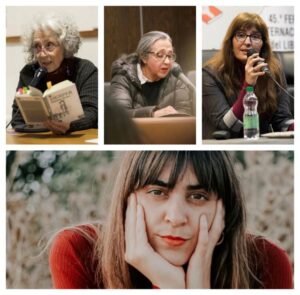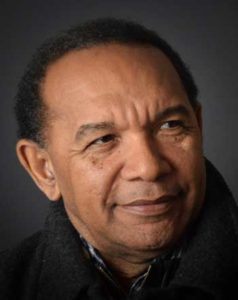From the Center of the World
Contemporary Poets of Ecuador
Selected, translated and introduced by
Margaret Randall

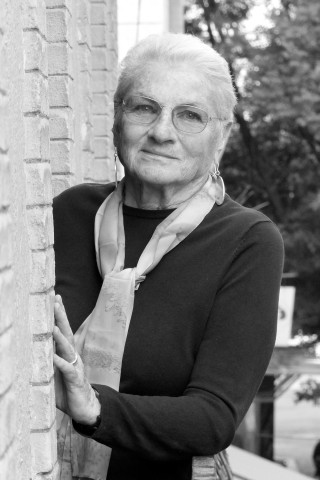
MARGARET RANDALL
COURTESY OF PASCUAL BORZELLI
JORGENRIQUE ADOUM (1926-2009)

Historia
Al comienzo, la patria
fue una gran página en blanco:
la arena, el mar, la superficie,
la sombra verde, la tinta
con que manchó el invierno la sabana.
Pero de pronto, sin que nada
pudiera detenerlo, hay un hombre
conduciendo a su familia por los márgenes,
entra, cae y escala hasta el renglón
ecuatorial buscando vida.
Yo vengo desde allí: desayuné con ellos
en la primera mañana de mi pueblo,
construimos sembríos contra el hambre,
un río de cereal llevamos a la harina
y supimos las leyes del agua y de la luna.
De la segunda página hasta hoy día
no hay sino violencia. Desde
el segundo día no hubo día
en que no nos robaran la casa
y el maíz y ocuparan la tierra
que amé como a una isla de ternura.
Pero mañana (mucho antes
de lo que habíamos pensado)
echaré al invasor y llamaré a mi hermano
e iremos juntos hasta la geografía
—el dulce arroz, la recua del petróleo—
y le diré: Señora, buenos días,
aquí estamos después de tantos siglos
a cobrar juntas todas las gavillas,
a contar si están justos los quilates
y a saber cuánta tierra nos queda todavía.
History
In the beginning, the nation
was a great white page:
sand, sea, surface,
green shadow, ink
winter staining the sheet.
But suddenly, as if nothing
could stop him, there is a man
leading his family along the edges,
he enters, falls and climbs
to the equator searching for life.
I come from that place: ate breakfast with them
on my people’s first morning,
we planted fields against hunger,
shaped wheat into a river of cereal
and knew the laws of water and the moon.
From page two until the present
there is nothing but violence. From
the second day there wasn’t one
when they didn’t rob our homes
and corn and occupy this earth
I loved like an island of tenderness.
But tomorrow (long before
we thought possible)
I will vanquish the invader, call my brother
and together we will find geography
—sweet rice, petroleum’s flock—
and I will say: Good day, Madam,
here we are after so many centuries
ready to gather all the sparrows,
make sure they weigh what they should
and learn how much land we have left.
MIGUEL DONOSO PAREJA (1931-2015)
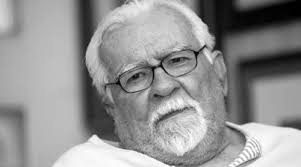
Regreso
a mi Madre
Estamos hoy muy cerca y sin embargo lejos.
En mis grises designios de amargas latitudes
fui dejando tus besos sepultados de olvido.
Y me he quedado solo,
mirando la verticalidad pretérita
de un poste desplomado,
o la horizontalidad en crisis de los senos
de una moza olvidada.
Y como dos extraños,
sin besos y palabras hermosas,
separando un abismo nuestro amor verdadero,
voy alargándome hacia ti
por el cordón umbilical de una mirada perdida,
como este puerto mío que se alarga en su ansiedad de océano
vengo a rogar tu amor y a dejar mi promesa
por un mejor mañana.
Tengo la sal de mi naufragio, tengo
una piedra en el alma y en los ojos
una ansiedad preñada de caminos,
una implacable sed; en las entrañas
y sobre el corazón y en el cerebro
tengo el azúcar de la tierra porque tú me la has dado.
Hay tantas cosas.
Tantas verdades que se escapan a los ojos
porque un beso nos amarra, en la distancia, la mirada.
Tantas verdades que se niegan,
porque hay un mar que llora abrazado del alma,
… y un doler
y una borrachera en la que vivo un mundo inaccesible,
inalcanzable,
como la ingenua sonrisa de una niña loca.
Madre hoy vengo a ti angustiado.
Con la angustia de un libro maltratado por un torpe
o un hombre esperando en una esquina
a la mujer de otro.
O el que escucha en la sala de una clínica,
su alimentado semen en el llanto de un hijo.
Vengo tímido y vengo avergonzado.
Con la timidez y la vergüenza de una sonrisa sin dientes
o un joven masturbándose.
Con la vergüenza de una niña desnuda
por primera vez ante los ojos de un hombre.
Con la vergüenza de un libro en la vitrina
que no es comprado nunca.
Vengo llorando.
Dejando al viento mis lágrimas de hijo
para que se unan al inmenso sistema de tu tanto
formado por tus lágrimas de madre.
Estarás orgullosa porque seré otro hombre
y he matado mi triste soledad y mi llanto
y ahora son las distancias y las acciones buenas
y aunque estamos muy cerca y sin embargo lejos
yo haré que esta acidez se convierta en dulzura
y de esta despedida sin viaje volveremos
para darnos un beso cuando estemos de vuelta.
Return
to my Mother
Today we are so close yet so far from each other.
On my gray journeys to bitter latitudes
I left your kisses buried in oblivion.
I remain alone,
gazing at the vertical history
of a fallen post
or your breasts in the horizontal crisis
of an abandoned boy.
And like two strangers,
with neither kisses nor beautiful words
separating the vast expanse of our love
I leave, wandering toward you
along the umbilical cord of a lost look,
like this port of mine that moves off on its ocean of anxiety
I come to plea for your love and promise you
a better tomorrow.
I taste the salt of my shipwreck, there is
a stone in my soul and in my eyes
the fraught tension of this passage,
insatiable thirst; in my gut
and heart and mind I hold
the sweetness of my land, your legacy.
There is so much.
So many truths that escape my eyes
because we are joined by a kiss, in the distance, by a look.
So many truths denied,
for there is a sea that cries embracing my soul,
. . . and pain
and the drunkenness in which I exist in an inaccessible world,
unreachable,
like the innocent smile of a crazy little girl.
Mother today I come to you in anguish.
The anguish of a book tossed aside,
a man waiting on a corner
for another man’s wife.
Or one who in a clinic hears
his fortified semen in the cry of his son.
I come to you hesitant and humiliated.
With the fear and shame of a toothless smile
or young boy masturbating.
The shame of a naked young girl
standing before a man for the first time.
With the shame of the book in the window
no one ever buys.
I come in tears
and deposit my tears of a son in the wind
that they may join the immense system of everything
created by your mother’s weeping.
You will be proud because I will be someone else.
I have killed my sad loneliness and weeping
and now there are distances and good deeds
and although we are close yet far away
I will turn this bitterness to sweet
and from this motionless goodbye we will return
to kiss one another when we are home again.
ULISES ESTRELLA (1939-2014)
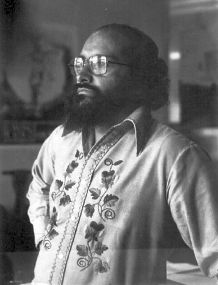
Piedras vivas
Si vinieron del Volcán
estas piedras
trajeron el Fuego
del contorno
al centro,
muy adentro
están fortificadas
desde los bordes
llaman a las caricias,
a descubrir los impulsos
apenas con el tacto
de quienes quieran descubrir
las fiebres internas.
Si fueron expulsadas
desde el fondo de la tierra
son quiteñas sustancias,
Piedras Vivas
que acompasan
los ritmos antagónicos
de nuestros corazones.
Semejantes a cabezas humanas
podrían haber salido de la Caverna
en busca de espacios donde apoyarse.
Living Stones
If they came from the Volcano
these stones
brought Fire
from circumference
to center,
deep inside
they are powerful
at their edges,
calling on caresses
to discover desire
with the simple touch of those
who search for hidden flame.
If they were expelled
from the depths of the earth
their substance belongs to Quito,
Living Stones
in step with
the antagonistic rhythms
of our hearts.
Like human heads
they might have emerged from the Cave
looking for a place to rest.
ANTONIO PRECIADO (1941)
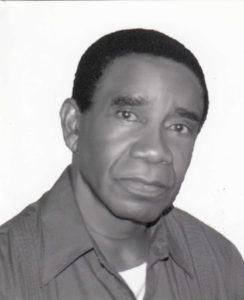
Anima primera
Todas las noches salgo
a hablar con los fantasmas.
Todos llegan a tiempo con el viento
agitando sus nombres
en una multitud desesperada.
¡Ah!
Juana la lavandera
solo anda en noches claras.
Siempre me llega en lunas,
lunas,
lunas,
chapoteando el agua.
Ved que me lavan los ojos,
que me enjuagan la palabra
veintiún manos azucenas,
con agua de nueve charcas.
Ángel, ¿quién enjabonó
trece veces tus dos alas?
¿Entiendes, Dios, la blancura
de tu espléndida garnacha?
¡Guardián del noveno cielo,
llueve una lluvia de nácar,
porque Juana ensangrentó
una punta de su sábana!
First Soul
Every night I go out
to speak with ghosts.
All show up on time, wind
rustling their names
in anxious multitude.
Ah!
Juana the washerwoman
only comes on clear nights.
She always arrives with the moon,
the moon,
the moon,
sloshing about in water.
Watch as they bathe my eyes,
twenty-one lily hands
rinsing my word
in the water of nine pools
Angel, who thirteen times
lathered up your two wings?
God, do you understand the clarity
of your splendid grape?
Guardian of the ninth heaven,
a mother of pearl rain falls,
because Juana bloodied
the edge of the sheet!
ANA MARÍA IZA (1941-2016)
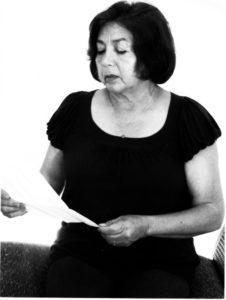
Lobo azul
No quise detenerte
pensaste que era el viento
la fuerza de gravedad que te empujaba
Y era el impulso mío
la sed de lo que parte
Bien puede ser
el sol tras la montaña
o la montaña en sombra desteñida
la ciudad que se esfuma en la ventana
la estela en barco convertida
el olor de los muelles
la hora cero
la caída del Dios que nos levanta
La dulzura de las manos solas
la mancha
en los pañuelos blancos
No quise detenerte
me gustabas por agua
Llévate el lobo azul
Déjame el lila pálido
Blue Wolf
I didn’t want to hold you back
you thought it was the wind
the force of gravity pushing you
And it was my impulse
thirst of what goes away
It might as well be
the sun behind the mountain
or the mountain in blemished shade
the city disappearing in the window
the comet transformed into a boat
the odor of the docks
zero hour
God’s fall that lifts us
The sweetness of hands alone
the stain
on white handkerchiefs
I didn’t want to detain you
I loved you in water
Take the blue wolf
Leave the pale lily for me
RAUL ARIAS (1943)

Que las palabras piensen,
se enternezcan, duerman, sueñan y despierten.
Que saliven como gatos ante la leche.
Que oigan alegres el estallido de los cohetes
en una fiesta popular.
Que jueguen como niños en la calle.
Que se saluden en un portal, guareciéndose de la lluvia.
Que las palabras continúen diciendo palabras
y usen pañuelos de colores en el cuello.
Que salgan de sus casas y se conecten
como hilillos de aire o de agua,
pequeños trozos de carne fluyente.
Que, antes que nada, luchen por las otras,
por las encarceladas en la ignorancia
o en las cárceles mismas.
Que las palabras piensen mejor cada día,
que amen la palabra libertad y la defiendan.
Que aprendan a odiar la palabra imposible
y no teman lo desconocido.
Que las palabras peleen, se alisten y desfilen.
It is true, words think,
are tender, sleep, dream and wake.
They salivate like cats before milk,
get excited when fireworks go off
at a community fair.
They play like children in the street.
They greet you in a doorway,
sheltering themselves from rain.
Words keep on uttering words
and wear colored handkerchiefs at their necks.
They leave their homes and merge
like delicate threads of water or air,
small flowing chunks of meat.
Before all else, they fight for the others,
those imprisoned by ignorance
or by brick and mortar prisons.
Each day words have deeper thoughts,
they love and defend the word freedom.
They learn to hate the word impossible
and are not afraid of the unknown.
Words struggle, get ready and fall into line.
SARA VANEGAS (1950)
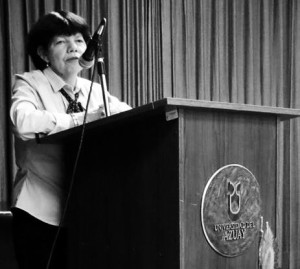
tu nombre . . . deja una cicatriz de naves incendiadas
aquí. en el océano de mi pecho
*
el cortejo de lunas es ya un recuerdo en tus ojos náufragos
la noche nos juntará en lo más hondo:
como un aullido
*
el fantasma de tu voz
aún me llama
hoy
por un nombre ya olvidado
*
en ciertas noches del año—dicen—emerge sobre la superficie del océano una ronda de delfines dorados formando extraños mensajes . . .
la luna entonces se va tornando azulada. lentamente
*
dicen que cuando la luna está azul brotan ciudades enteras del fondo del mar. que sus habitantes (de ojos fosforescentes y oscuros ropajes) inician entonces una larga danza que no cesa hasta que algún puerto se arroja a las profundidades
¿quién no ha visto arder el mar en esas noches?
*
mar que me bebes gota a gota
noche a noche
mar que me sorbes
desde tu eternidad amarga
*
voces que reclaman tu garganta. voces oscuras. voces que se enredan en tu lengua y en tus manos. voces que te atrapan
y te encadenan al mar
*
voces encadenadas voces que arrastra el mar de tarde en tarde
*
collar de voces que aprisiona mi garganta desde su origen tras el agua
your name . . . leaves a scar of burning boats
here. in the ocean of my breast
*
the entourage of moons remains a memory in your shipwrecked eyes
night will join us in the deepest place:
like a howl
*
the ghost of your voice
continues to call me
today
by a name already forgotten
*
on certain nights of the year—they say—a circle of golden dolphins rises to the ocean’s surface forming strange messages . . .
then the moon turns blue. slowly
*
they say when the moon is blue whole cities spring from the bottom of the sea. then their inhabitants (with phosphorescent eyes and dark clothing) begin a long dance that does not end until some port throws itself into the depths
on those nights, who hasn’t seen the sea burn?
*
sea that drinks me drop by drop
night after night
sea that sips me
from its bitter forever
*
voices reclaiming your throat. obscure voices. voices that tangle on your tongue and in your hands. voices that trap you
and chain you to the sea
*
chained voices
voices that drag the sea
from one afternoon to another
*
necklace of voices imprisoning my throat
from its home beyond the water
CATALINA SOJOS (1951)

Ruinas (fragmentos)
I
a la primera palabra le ofrecimos un poncho de espóndilos
y en sus tobillos atamos sonajeras
cuando la noche se volvió hueso
ella huyó con su aire
luego quedamos manchas
de aquellos que creímos danzar en su esqueleto
II
cuentan que el corazón del inca se transformó en aríbalo
sus fragmentos se exhiben
con esa terca actitud de las cosas que sobreviven al olvido
III
jamás sabrás quién es el vigilado
los pasos van y vienen
detrás del muro con las cinco hornacinas
arde la luna en la piedra sacrificial
hay un olor a escombro
a tierra retorcida
no, nunca habrás de saber
quién es el vigilante, el vigilado
Ruins (fragments)
I
at the first word we offered her a poncho of stressed syllables
and adorned his ankles with rattles
when night turned to bone
she and her attitude fled
later we were simply images
of those who believed we danced in her skeleton
II
they tell us the Inca’s heart retained an afterglow
its fragments are displayed
with that stubborn attitude of that which survives obscurity
III
you will never know who is being watched
footsteps come and go
behind the wall with five niches
the moon burns on sacrificial stone
there is an odor of debris
of devious earth
no, you will never know
who is the watched, who watches
JENNIE CARRASCO (1955)

Miedo
Durante toda mi vida
cargué a mis espaldas
el miedo de los hombres
no era un miedo mío
era el de mi padre
el de mi marido y de mi hermano
el de todos mis amantes
el miedo de mis hijos
Me pesaban esos temores malheridos
guerras, gritos ciegos
el fuego que al principio descubrieron
se volvió devastador
yo, mujer de aguas oscuras
de aire negro
sólo en la luna me reconocía
No era un miedo mío
yo dominaba los secretos de las flores
y los rincones más profundos
sembré y coseché
mi sangre fecunda
dio a luz la vida y la muerte
día tras día, siglo tras siglo
me parí a mí misma
Vagando en la nada pregunto
¿cómo matar el miedo de los hombres?
¿Cómo matar mi propio miedo?
Fear
All my life
I have carried men’s fear
on my back,
not my own fear
but my father’s
husband’s and brother’s
the fears of all my lovers
the fears of my sons
Those damaged fears weighed on me,
wars, blind screams,
at first the fire they revealed
turned devastating
I, a woman of dark waters
and somber air
could see myself only in the moon
It wasn’t my fear,
I owned the secrets of flowers
and hidden places,
I planted and harvested,
my fertile blood
gave birth to life and death
day after day, century upon century
I birthed myself
Wandering in nothingness I ask
how can we kill men’s fear?
How can I kill my own?
SARA PALACIOS (1955)

La ballena
La ballena sufre para ser amada
se entristece para ser amada
se emborracha para ser amada
baila, mueve las manos para ser amada
hace poemas para ser amada
y por fin . . . es amada.
Entonces
salta, con su enorme cuerpo
se hunde en el agua y se va
sin importarle nada
porque es ballena.
The Whale
The whale suffers for love
sorrows for love
gets drunk for love
dances, moves its hands to be loved
writes poems to be loved
and finally . . . is loved.
Then
it leaps, its enormous body
disappears underwater and leaves
without a thought in the world
because it is a whale.
MARITZA CINO ALVEAR (1957)

Cuerpos guardados
1
Infiel a mi sombra original
he atravesado efigies y pirámides,
me he acercado a la prehistoria
del placer
con la clarividencia de lo breve.
La sanación ha llegado,
en tinieblas
cuando menos la esperaba
devastando cábalas y adioses.
2
En este manuscrito reposan las sustancias
de antiguos ritos destinados a los mares,
de esa mitad de eternidad que me persigue
en un memorial ausente de palabras.
Esta ceremonia no es sagrada
solo un oleaje de sintagmas
en el ojal de una blusa desgastada
por el rumor del olvido y la ironía.
La otra mitad de eternidad
desconoce la rutina y el silencio,
voces que se mutan en esencias
de una escritura que conspira en mi retina.
3
Me acosa la etimología del no decir
asignando la escritura a un lugar común
repetirme en el sonido del agua,
cada vocablo me conduce al origen.
Las mismas palabras se anuncian
caricaturas en blanco y negro,
cualquier pista es una huella ausente.
Una nueva parodia me atrapa
la cotidianidad me libera.
Me entrego al sonido del fuego.
4
Dejé de escribir
con la exactitud del calendario
después de que me embalsamaran sus textos
y me convirtiera en pirámide.
Ahora lo sé
por sus olores mortales
signos de luto
que fermentan las tumbas,
mientras yo transito invertida
con otra voz que me viene,
de la escritura de un dios
que no es el dios de los muertos.
Hidden Bodies
1
Unfaithful to my first shadow
I have traveled effigies and pyramids,
approached the prehistory
of pleasure
with barely perceptible clairvoyance.
Healing has arrived,
when least expected
in shadows threatening cabalas and farewells.
2
The substances live in this manuscript
of ancient rites headed for the sea,
from this half of eternity that stalks me
with a wordless monument.
This ceremony is not sacred,
only a surge of phrases
from the buzz of irony and oblivion
in the buttonhole of a worn-out blouse.
Eternity’s other half
knows nothing of routine and silence,
voices muted in the essence of writing
conspiring in my retina.
3
The etymology of silence stalks me,
assigns writing to cliché,
repeats the sound of water,
every word takes me back to the beginning.
The same words present themselves
as black and white caricatures,
any trail is an invisible footprint.
A new parody claims me,
the commonplace sets me free.
I give myself to the sound of fire.
4
After they embalmed my texts
and turned me into a pyramid,
I stopped writing in accordance
with a precise calendar.
Now I know the signs
of keening
by their mortal odors
fermenting tombs,
while I pass by in reverse
with another voice that comes,
possessed by the writing of a god
not the god of the dead.
CARMEN VÁSCONES (1958)

Poema
El acuario revuelve la oquedad del pez
La mitad de una concha ilumina al marino
Que no pudo salir del sueño
La sirena fue una presencia inesperada
Entre cristales el cantar de los días
Sucede el carnaval
Viene la cuaresma…
La duda solloza su olvido
El cráter confiesa sobre la ciudad
Su círculo recorre la intimidad de una correspondencia
La vertiente del nudo cambia la rotación
La nevada una centrífuga del ciclo
Los ciclos de la llegada entonaron un eco de hábitos
Las historietas tras los despuntes del topo
La hiena pisa el esquema del degollador
La banda suelta día a día la torsión del tenor
El desbande aplasta algo dejado a la intemperie
Los modos del espectador resuenan en el génesis cancelado
El pasado levanta la efigie infantil
El paso de una reverencia elogia la inocencia
Con una noche oral desprendiéndose en el horizonte
El estilete recorta una hazaña
La sepultura conmemora su advenimiento
El ideal: un soplo de amor de cuerpo a cuerpo
El tribunal absuelve su propia condena
Un azar disecado en cada cuerpo
La colonia de caníbales acecha la historia
La nada: un silencio pegado a la huella
Baila sobre el cadáver del encomendado
El universo parece un ángel decapitado cayendo en el átomo
El color del círculo marcó la salida
Un deseo centrípeto acompaña la fuga
El destino se fragmenta en persecuciones
El fugitivo cruzó la frontera
Se acerca al reposo
Deja de huir
Se entrega a él.
Poem
The aquarium moves through the fish’s cavity
A half shell illuminates the sailor
Unable to emerge from his dream
An unexpected mermaid
Carnival comes around
Lent arrives
Days sing among crystals . . .
Doubt sobs its oblivion
The crater pleads guilty above the city
Circumference travels relationship’s intimacy
The knot’s gradient changes direction
Snow is a centrifuge in the cycle
Patterns of arrival leave an echo of customs
Comic books follow the mole’s dawn
The hyena steps on the executioner’s blueprint
Day after day the band turns loose the tenor’s torque
A mad rush tramples something left outdoors
The spectator’s manners sound in cancelled genesis
The past raises a childlike effigy
A passing reverence applauds innocence
With a vocal night taking leave of the horizon
The stiletto slashes a deed
Burial commemorates its accession
The ideal: a breath of love from one body to another
The tribunal absolves the sentence it hands down
Desiccated luck in every body
A colony of cannibals stalks history
Nothing: silence stuck to a footprint
Dancing on the corpse of the trusted one
The universe is like a decapitated angel falling inside an atom
Circle’s color signals the exit
A centripetal desire accompanies escape
Destiny fragments into abuse
A fugitive crossed the border
Sleep draws near
Stop fleeing
It gives itself to him.
RAÚL VALLEJO (1959)
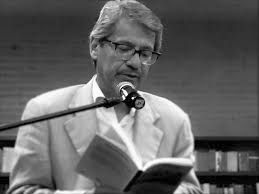
Y, ENTONCES:
Y, entonces,
¿para qué escribo?
¿para quién escribo?
La literatura debe ser un bálsamo para el estrés, no este sinsentido
que me tomará por asalto y desnudará el oxímoron en el que existo.
¿Qué valor tiene mi palabra si yo mismo soy un pozo de miedos,
polvareda que se levanta para convertirme en imagen difuminada
del ser que soy, proliferación de identidades, penitente del verso,
perenne forma en movimiento hacia nueva forma contradictoria?
Como los escritores ya no somos vanguardia de nada,
[¿es que alguna vez lo fuimos?] la política nos apesta ahora
los escritores somos mercancía exhibida en el mercado de las vanidades.
WHY DO I WRITE?
Why do I write?
For whom do I write?
Literature should be a balm for stress, not this meaningless script
that will take me by surprise, undressing the oxymoron in which I exist.
What value has my word if I myself am a well of fears,
dust rising to turn me into a blurred image
of myself, proliferation of identities, penitent of verse,
perennial voice reaching for a new and contradictory voice?
As we writers are no longer any sort of vanguard,
[were we ever] politics stink now
we are merely merchandize displayed in the market of vanities.
EDWIN MADRID (1961)
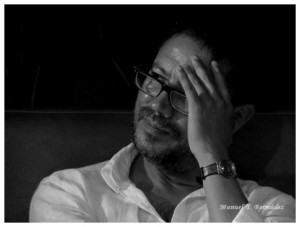
Noches de Granada
Estoy en Granada
El sol pica la piel y
tu recuerdo pica mi corazón.
¿No sé qué hago junto al Lago de Nicaragua?
Es un mar que topa los volcanes
y yo me hundo en las aguas negrísimas de tus ojos.
Voy de isleta en isleta
mirando como viven los nicaragüenses
¿Qué hago en Nicaragua,
38 grados a la sombra,
si mi nostalgia por ti
alcanza los 40 grados en la noche?
Granada,
ciudad de casas azules y verdes y amarillas
e imagino que en aquel patio de paredes rojas
tú bailas y me esperas
mas yo solo
recorro las calles
en busca de una lata de cerveza.
¿Qué hago aquí?
Gioconda Belli lee sus poemas
y Cardenal
y otros cientos de poetas
pero ningún poema dice
cuánto te extraño estas noches.
Granada Nights
I’m in Granada
The sun burns my skin and
you burn in my heart.
What am I doing on Lake Nicaragua?
It is a sea with a backdrop of volcanoes
and I submerge myself in the dark liquid of your eyes.
I go from one tiny island to another
observing how Nicaraguans live
What am I doing in Nicaragua,
100 degrees in the shade,
if my longing for you
reaches 104 at night?
Granada,
city of blue and green and yellow houses
and I imagine you in that patio of red walls
dancing and waiting for me
yet I
roam these streets
looking for a bottle of bear.
What am I doing here?
Gioconda Belli reads her poems
and Cardenal
and hundreds of other poets
but none of their poems tell
how I miss you on these nights.
ARIRUMA KOWII (1961)
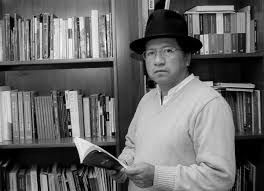
Shimikunaka
Shimikunaka, kawsaytami charin
Wiñachinata, wañuchinata
Ushanllami
Shimikunaka tupu, huyaypash, kayta
ushanllami
Shimika achka kamaktami charin
Huyani nikpika
Mana riksishka pachakunata
riksichinllami
mitimay kawsaytapash
karanllami
shimika, inti, killami kan
shimika, kawsaypa llantumi
kan.
Las palabras tienen vida
tienen la capacidad de construirnos
o destruirnos
La palabra tiene tanto poder
que, por ejemplo, un “te quiero”
puede catapultarnos
a dimensiones inexploradas
o exiliarnos en el vacío.
La palabra es el sol, es la luna
es la huella
de nuestro existir.
Words are alive
they can create
or destroy us
A word has such power
that, for instance, “I love you”
can launch us
into unknown dimensions
or exile us to the void.
A word is the sun, the moon,
the footprint
of our existence.
Makipurarina
Ñawpamanta kawsaykunaka makimpurarinmi:
Samaywan rikurin, rimankuna,
Shimikunaka, samashka, achikyashka,
huanushka pachamanta shimikunami kan
shinallatak, yuyaykunaka
tamiamanta, intipachamanta wayumi kan
kay pachakunata wayllayachin
shamuk pachakunata
kawsana munaywan, watachin.
El pasado y el presente se dan la mano:
se miran serenos, dialogan.
Cada palabra es fruto
de tiempos reposados, iluminados, abonados.
Cada expresión es el fruto
de inviernos y veranos equilibrados
que hacen reverdecer el presente
que auguran un futuro asediado
por el deseo incansable de la vida.
The past and present hold hands:
look serenely at one another, converse.
Each word is the fruit
of tranquil illuminated fertile times.
Each expression the product
of winters and summer in equilibrium
causing the present to bloom
predicting a future besieged
by the insatiable desire for life.
XAVIER OQUENDO (1972)

Mi abuelo y mi abuela
tenían un caminar maduro.
Ella, pausada en el galope;
él, acelerado y discurrido.
Caminaban, mirando la última huella
que había dejado el animal de turno.
Ella seguía el paso del hombre
como una secuencia natural.
El río de mi abuelo
y de mi abuela
no se parece al Guadalquivir
ni al Guayas.
Es un río de piedra que desciende
sobre las sendas
que faltan por conocer
y adentrarse.
Mi abuela nada tiene que ver
con la abuela de Perencejo.
Perencejo no tiene esos senderos
ni ese paso seguro y lento.
El abuelo de Fulano
no conoce el camino que mi abuelo guarda
en el bolsillo:
sendero extraviado
entre la menta y el “king” sin filtro
que olían sus pantalones.
Mi abuelo se parece a los astros.
Mi abuela es un astro.
Mi abuelo se parece a mi abuela
y los dos a las estrellas.
Nada tienen del Guayas ni del Guadalquivir.
Ni de los viejos Fulano y Perencejo.
Los miramos
a través de las radiografías de sus huellas.
Miramos sus sendas como esfinges
que heredamos para practicar la fe.
Nada tienen que ver con mis zapatos torcidos.
Caminaron, los dos, el valle hasta la muerte.
Son un río que esconde a las aguas
debajo de las piedras.
My Grandfather and Grandmother
had a mature way of walking.
She hesitant in her purpose;
he in a hurry and flying.
they walked, observant of the footprint
left by the animal that preceded them.
She followed in the steps of her man
as if in natural sequence.
My grandfather’s river
wasn’t anything like
the Guadalquivir
or Guayas.
It is a river of stone that descends
over trails
yet to be discovered
and explored.
My grandmother wasn’t like
So-and-So’s grandmother.
So-and-So’s grandmother doesn’t possess those trails
nor that slow and sure step.
So-and-So’s grandfather
doesn’t know the pathway my grandfather keeps
in his pocket:
a pathway misplaced
between a mint and the King without filter
that gave his trousers their odor.
My grandfather looks like the stars.
My grandmother is a star.
My grandfather looks like my grandmother
and they both look like stars.
They have nothing to do with the Guayas or Guadalquivir.
Nor with any old So-and-So.
We glimpse them
in the x-rays of their footprints.
We look at their pathways like the sphynxes
we inherit to practice our faith.
They have nothing to do with my crooked shoes.
The two of them walked the valley to death.
They are a river that hides its waters
beneath the stones.
JULIA ERAZO (1972)
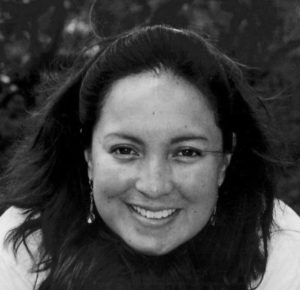
Cicatrices
¿Quién dijo que la herida estaba herida
ahora que la tierra se secó?
Carlos Otero
hay algo en ella que sonríe al subir los escalones de la casa algo que despierta la danza entre los guacamayos
algo en su mirada donde chocan las olas y saltan los peces
algo que se mueve delicado entre sus piernas
hay algo que hace salir a los sapos de entre la maleza
algo que ha dejado huellas allende sus sandalias
algo en el batir vaporoso de su falda
algo en el viento
que cruza por su cabellera
algo desfigura el paisaje
algo asusta de pronto a los sapos que se esconden
algo empuja a las aves a volar
algo desborda el brillo del océano en sus ojos
algo me inquieta
si voy detrás
algo en sus hombros
algo justo encima del cinto de su falda
algo que su blusa revela tenue en su espinazo
hay algo en esa mujer que no se justifica
Scars
Who said that the wound
was wounded
now that the earth is dry?
Carlos Otero
something in her smiles as she climbs the steps to the house
something that causes her to dance among the guacamayos
something in her expression where waves break and fish jump
something trembling between her legs
there is something that lets frogs escape into the brush
something left by the soles of her sandals
something in the vaporous movement of her skirt
something in the wind
flowing through her hair
something disfigures the landscape
something suddenly frightens the sheltering frogs
something lifts the birds in flight
something overflows the ocean’s brilliance in her eyes
something bothers me
when I follow her
something in her shoulders
something just above the waistband of her skirt
something her blouse reveals tenuous along her spine
there is something in that woman that’s just not right
respuesta acuosa
to Sandra Beraha
si las lágrimas no fueran parte del océano y las palabras no fueran los peces
y las esperas unas olas poco benevolentes y las penas el alimento que nos
desnuda el frío
y si tú no fueras el mástil y si los otros no nos alzáramos como las velas
si el planeta no fuera una brújula o un globo flotante en el vacío del universo
si la vida no fuera la ficción de otros pensamientos
si ya no durmiéramos sobre hojas transparentes y si despertáramos
al abrazo de nuevos líquidos y antiguas voces
si ya pasáramos la línea del verso y si no quisiéramos más que el simple
estado de la arena
mojados y secos
secas y mojadas
removidos y lanzadas
hundidos y montículas
watery response
to Sandra Beraha
if tears didn’t belong to the ocean and words weren’t fish
if waiting wasn’t tight-fisted waves and sorrow what keeps us from cold
and if you weren’t the mast and the others didn’t overwhelm us like sails
if the planet wasn’t a compass or globe floating in the emptiness of space
if life wasn’t the fiction of others’ thoughts
if we no longer slept on transparent leaves and woke to the embrace
of new liquids and ancient voices
if we’d already gone beyond the poem’s line and wanted nothing more
than the simplicity of sand
wet and dry
dry and wet
churned and launched
immersed and raised
ANA CECILIA BLUM (1972)
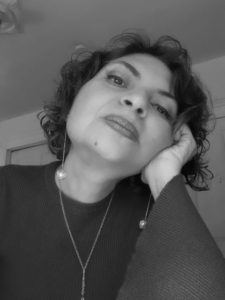
Poeticus
Escribo, porque no puedo pelear batallas con mis manos
y el lápiz—a veces—apunta mejor que la escopeta.
Escribo, porque el verbo escribir suena a única certeza,
y es ruta sin distancias, y es cuerpo sin virus.
Escribo, porque la hoja en blanco es un gato feral
y debo recogerlo, alimentarlo, darle guarida, amarlo.
Escribo, porque los adjetivos acechan y cuando matan,
también dan vida; porque el lugar común no me asusta
y lo que se ha dicho mil veces, igual salpica su encanto.
Escribo, porque todo en mí es un desencuentro:
los terminales se mudan, las calles cambian de nombre,
y nunca atino estaciones, horarios o trabajos, retornos o partidas.
Escribo porque aunque duele, no duele tanto.
Escribo, para llenar los cántaros,
limpiar los espejos,
empuñar los espacios,
caminar los laberintos.
Escribo, para no morirme de pena.
Por eso escribo . . .
Poetica
I write because I cannot go into battle with my hands
and the pencil—at times—has better aim than the gun.
I write because the verb to write sounds like the only sure thing,
and it’s a journey without distances, a body without a virus.
I write because the blank page is a feral cat
I must take in, feed, shelter and love.
I write because adjectives stalk me and when they kill
they also give life; because clichés do not frighten me
and what has been said a thousand times can also delight.
I write because everything in me is missed opportunity:
terminals switch places, streets change their names
and I never get the right station, schedule, job or comings and goings.
I write because although it hurts it doesn’t hurt that much.
I write to fill the jar,
clean my glasses,
push spaces forward,
walk through labyrinths.
I write so I won’t die of shame.
That’s why I write . . .
ALEYDA QUEVEDO (1972)
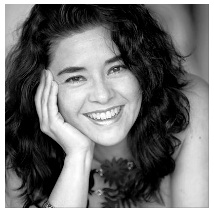
Corales
No importa la profundidad del descenso
o la imposible maleza derramada en el camino.
Es largo y frío el viaje sobre oscuros caballos.
Ejercicio de inmersión y belleza piadosa
hasta pisar altos jardines de coral negro.
Entre mi dolor -que conozco tanto desde el lodo-
y el universo poco explorado por la falta de tus palabras,
me quedan flotando la impenetrabilidad de la música y la sal.
Las medusas atrapadas entre mis pestañas me jalan rápido.
Mas no importa el precio del descenso.
Es necesario volver al camino consciente del miedo
y el aliento del océano golpeándome en la nuca.
Coral
The depth of the descent doesn’t matter
nor the impossible weeds scattered along the way.
The journey on dark horses is long and cold.
An exercise in immersion and merciful beauty
until we come to high gardens of black coral.
Between my pain -that I know so well from the era of mud-
and the universe I’ve explored little for lack of your words,
float the impenetrability of music and salt.
The jellyfish trapped in my eyelashes pull me tight.
And the price of descent matters not.
I must return to the conscious path of fear
and the ocean’s breath hitting the nape of my neck.
CARLOS VALLEJO (1973)
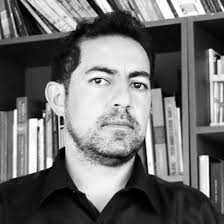
Carta de madrugada
Fantasma es el tiempo que besas,
beso que se ensancha y no te olvida,
humo pretérito donde hay ascuas,
ascuas que todo lo entienden y no lo dicen.
¿Conoces el relámpago varado en tu distancia?
La semilla del invierno tiembla en mis zapatos.
Oigo el amarillo entre tus pasos,
mas no sé a cuantos palmos de ti transita el amanecer.
Sé de tus mejillas que cruzan blancas
por las horas del desayuno,
y sé de las sombras de tu cielo
llenando los patios.
¿Cuántos calendarios vaciaré este día?,
¿Cómo me sostengo en este solitario sol?
Di más que un siglo, ¡dime más que un ahora!
porque tus labios conocen la fiesta
de nuestros antiguos pájaros.
¿Cuándo vuelves?
Mándame el día. Mándame noticias de tu boca.
Yo te envío un beso,
y dime, en mi comarca, ¿qué perro no te extraña?
Dawn’s Letter
You kiss a ghostly time,
a kiss that expands and won’t let you go,
past-tense smoke where embers remain,
embers that know all and don’t let on.
Do you know the lightning stranded in your distance?
A winter’s seed trembles in my shoes.
I hear the yellow between your footsteps,
but do not know how far dawn moves past you.
I know your cheeks piercing half-notes
at breakfast time,
and I’ve heard tell of your sky’s shadows
filling courtyards.
How many calendars will I empty today?
How will I stand tall in this solitary sun?
Tell me more than a century, more than a now!
because your lips know the feast
of our ancient birds.
When will you return?
Send me the day. Send me news of your mouth.
I send you a kiss,
and tell me, in my part of the world, what dog doesn’t miss you?
LUCILA LEMA (1974)
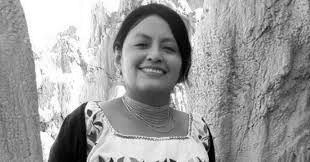
14
ñuka puriyta mana allikachinakun
yallikta rikushpa
—payka mana kaymantachu nishpa— upallakuta ninakun
kaymanta warmikunaka mana shina tiyarinchu
kaymanta warmikunaka mana shina churakunchu
kaymanta warmikunaka mana shina rimanchu
kaymanta warmikunaka mana yachaywasiman rinchu
kaymanta warmikunaka mana nataka ninchu ninakun
ñukakarin yana urkuta
tunirshka ruku wasita yarikukpipash
ñukanchik kawsakkuna
ñukanchik wañushkakuna chaykunallatak kakpipash
shukmi nishpa rikuwanakun
yallikta rikushpa
—payka mana kaymantachu nishpa— upallakuta ninakun
14
no les gusta mi caminar
me ven pasar y susurran
—ella no es de aquí—
no se sientan así las mujeres de aquí
no se visten así las mujeres de aquí
no hablan así las mujeres de aquí
no van al colegio las mujeres de aquí
no aman a otros hombres las mujeres de aquí
no dicen no las mujeres de aquí
aunque yo extraño el monte negro
y la casa vieja que ahora es tierra
aunque nuestros vivos
y nuestros muertos son los mismos
les parezco extraña
me ven pasar y susurran
—ella no es de aquí—
14
they don’t like the way I walk
they see me go by and whisper
—she isn’t from here—
she doesn’t sit like the women from here
she doesn’t dress like the women from here
she doesn’t talk like the women from here
the women from here don’t go to school
the women from here don’t love strange men
the women from here don’t say no
although I miss the black mountain
and the old house that has returned to earth
although our living
and our dead are the same
I seem strange to them
they see me go by and whisper
—she isn’t from here—
LUIS ALBERTO BRAVO (1979)

Una chica golpeada en la piscina
Su lengua ahora es más larga
y hay rastros de pasta dentífrica.
Ahora ella cierra los ojos donde lloraba.
Ahora las hojas vuelan para todos lados,
y vuelven a caer . . .
. . . . . . . . . . . . . cerca de aquí . . .
. . . . . . (Donde estaba la chica golpeada y muerta en la piscina).
La sacaron del agua
como quien saca a un pequeño esqueleto,
como quien carga una madera pintada . . .
O como quien mide al primer amor.
Y mientras le espiaban las nalgas . . .
—”Pero, ¿las nalgas de quién?”
—”Pues, de ella . . .
de la chica golpeada y muerta en la piscina”—.
. . . . . . alguien le sacó unas fotos;
Y por ello,
ahora podemos decir cuando nos preguntan
. . . . . . . . . . . . por la chica golpeada y muerta en la piscina:
. . . . . . . . . . . . . . . . “Ella estaba ahí . . .
. . . . . . . . . . . . . . . . . . . . Y nosotros acá . . .
. . . . . . . . . . . . . . . . . . . . . . . . . Y los tipos de las fotos más allá”.
En la cercas pintadas
los vecinos murmuran & enrabietados
exclaman: “Si bien, era una mala chica,
no merecía morir en una piscina”.
—”Pero, ¿ha muerto quién . . .? ¿Quién ha muerto, quién?”
—”Pues ella . . .
La chica golpeada y muerta en la piscina”—.
“Yo le solía traer cervezas,
y cuando me daba propinas
ella solía decir:
.. .. .. .. .«Sólo un ángel como yo
.. .. .. .. .dejaría caer sobre ti
un pedazo de manzana…
.. .. .. .. .—Como quien deja caer sobre una isla—
.. .. .. .. .y verdaderamente lo soy»
(…) (glup)
Aún así, no tenía que morir en una piscina”.
“La mujer de allá,
nos ha dicho que a veces solía verla llorar en el patio,
y luego saltar las cercas pintadas,
sólo para arrancar —con un instrumento del bosque—
todas las manzanas fuertes”.
…
Desde aquel día
vengo a esta casa de martes a jueves…
Y siempre, siempre
un pequeño ojo del atardecer
.. .. .. …… .perfora las nubes (y luego llueve).
Y entonces… ella abre sus alas, se eleva (y llueve) y abre sus alas
.. .. .. .. . (como si evocara la luz de un perro sobre una nube podrida).
—“Pero, ¿quién? ¿Me hablas de quién?”
—“Pues, de ella…
De la chica golpeada y muerta en la piscina”—.
A Beat-Up Girl in the Swimming Pool
Her tongue is longer now
and there is a residue of toothpaste.
Where she cried, now her eyes are closed.
Now leaves fly everywhere,
and fall again . . .
. . . . . . . . . . . . . . . . . . nearby . . .
. . . . . . . . (Where they found the beat-up girl in the swimming pool).
They pulled her from the water
as one retrieves a brief skeleton,
as one recovers a piece of painted wood . . .
Or measures first love.
And while they gawked at her buttocks . . .
—”But, whose buttocks?”
—”Well, hers . . .
the beat-up girl in the swimming pool”—
. . . . . . . . someone took some pictures of her;
And so, when they ask, we can say
. . . . . . . . . . the beat-up girl dead in the swimming pool:
. . . . . . . . . . . . . . .”She was there . . .
. . . . . . . . . . . . . . . . . . . And we were here . . .
. . . . . . . . . . . . . . . . . . . . . . . . And the guys who took the pictures over there.”
By the painted fences
the neighbors murmur &
exclaim enraged: “Even if she was a bad girl,
she didn’t deserve to die in a swimming pool.”
—”But who died . . .? Who died, who?”
—”Well her . . .
The beat-up girl in the swimming pool”—
“I used to buy her beer,
and when she tipped me
she’d say:
. . . . . . . . “Only an angel like me
. . . . . . . . would let a bite of apple
fall on you . . .
. . . . . . . . —Like one who lets herself fall on an island—
. . . . . . . . and I truly am one”
( . . . ) (glup)
Even so, she shouldn’t have died in a swimming pool.”
“The woman over there,
told us she sometimes saw her crying on the patio,
and then jump the painted fences,
just so she could uproot—with a basic tool—
all the crabapples”.
. . .
Ever since that day
I come to this house from Tuesday to Thursday . . .
And always, always
a small eye at evening
. . . . . . . . pierces the clouds (and it rains).
And then . . . . she spreads her wings, she rises (and it rains) and she spreads her wings
. . . . . . . . . . (as if she were conjuring a dog’s urge above a rotten cloud).
—”But, who? Who are you talking about?”
—”Well, her . . .
The girl beat-up and dead in the swimming pool”—.
SANTIAGO GRIJALVA (1992)
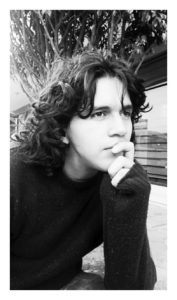
Despedidas para nombrarte
Estés en mí como la madera en el palito
Juan Gelman
Los años van en mi contra
me dicen que desvuelva la silueta de los días,
que me esconda en los escondrijos de una memoria
que me enciende
al sentir como golpean
se enciende,
se esconde
para que vuelvan a golpear.
Solo suena el cristal
por dentro de la lluvia
solo nace el ayer en las próximas nostalgias,
quedarse sin ser
estar tan cerca de Dios
para sentir su aliento.
Aquí llueve dentro de casa
soles nacen por debajo de la falda del tiempo.
Preguntas por el día
el volver y tu ausencia,
por el fuego de Prometeo,
las espaldas de las tortugas
y por el qué hacer después de nuestro encuentro.
Me voy apagando en esta lluvia
sobre los destellos nacientes del cielo
que cae como un manto oculto en los dedos de la luz,
vuelvo la cabeza
veo agua en mi madera,
rasguños en los dolores y cuerpo.
El fusil aguarda cargado
pero ¿qué queda después de esta guerra?
¿qué después de tanto invierno, de tanto andar errante?
Estás en mí como la madera en el palito
para no soltar la mano fría de mi espera
estoy en ti, como tú
el nosotros en nuestras despedidas.
Farewells to Name You
You are in me like wood in the plank
Juan Gelman
The years are against me,
they say they’re giving back a silhouette of days,
saving me a lair of memory
igniting me
when I feel their blows,
igniting,
hiding in fragile order
to evade more blows.
Glass sounds
within rain alone,
yesterday is only born in future nostalgias,
to be here without
getting so close to God
you can feel his breath.
Here it rains inside the house,
suns are born beneath time’s skirt.
You ask about the day,
return and your absence,
for Prometheus’s fire
the backs of tortoises
and what we must do once we meet.
Here I am burning out in this rain
in the sky’s incipient glitter
falling like an unseen blanket on fingers of light,
I turn my head
glimpse water in my wood,
scratches on pain and body.
The gun is kept loaded,
but what remains when this war is over?
After so much winter, so much wandering?
You are in me like wood in the plank
so as not to let go of the cold hand of my waiting
I am in you, like you,
the we in our farewells.
RENÉ GORDILLO (1993)
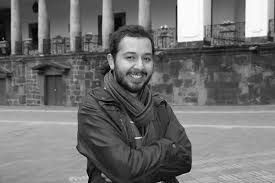
Poema incompleto
Este es un poema incompleto,
su incompletud me medio llena
el corazón y a duras penas recuerdo
el calor de las piernas de la mujer amada
la otra parte del recuerdo es otra mujer amada.
Y así me acuerdo de media nube, de medio sueño
de la media sonrisa de mi madre, del medio pasaje
en el colegio y la media vista de la ciudad en la media terraza.
El medio mar y la media montaña,
la media aritmética, media de tabacos,
el trabajo a medio tiempo que quise para escribir más y mejor
la media palabra con la que me hubiese resignado para no irme.
Este poema fue hecho con todas las mitades que le faltan,
como todos los poemas es un retazo que no le toca ni el amor ni la tristeza
porque son palabras, palabras que si pudieran matarnos de una
vez lo harían.
Pero gracias a Dios, qué bueno esto de escribir la historia de lo
incompleto
para que la nostalgia, si viene, nos tome por partes.
Incomplete Poem
This is an incomplete poem,
its incompleteness fills my heart
halfway and I barely remember
the heat of my beloved’s legs,
the other half of that memory belongs to another woman.
And so, I remember half a cloud, half a dream
my mother’s half smile, the half landscape
of school and half view of the city from half a balcony.
Half a sea and half a mountain,
half arithmetic, halved cigarettes,
the half-time job I wanted so I could write more and better,
the half a word that would have kept me from leaving.
This poem was made with all the necessary halves,
like all poems it is a remnant untouched by love or sorrow
because it is made of words, words that would kill us
if they could.
But, thank God, it’s a good thing to write a history
of the incomplete
so that nostalgia, if it comes, only overcomes us by halves.
JUAN SUAREZ PROAÑO (1993)

Enseñanzas
En la infancia quisieron enseñarnos
el color del cielo
pero jamás nos mostraron
las nubes de humo, no dejaron entrar
el sol de las despedidas.
Nos enseñaron los nombres
y ocultaron su sangre,
aprendimos a deletrear la historia
y repetimos hasta el cansancio
las capitales de la belleza,
los himnos de pájaro exiliado.
Nos enseñaron las palabras de perdón
solo para que pudiéramos repetirlas
cuando amábamos la protección
de la noche.
Nos enseñaron a sumar las culpas
pero nos ocultaron el resultado
de frotar dos rocas
o dos cuerpos
hasta que surja algo.
Nadie nos enseñó
que podían expulsarnos
de dios y de la tierra
si en lugar de decir cuerpo lo mostráramos
si decíamos mar
y en el fondo
nos ahogábamos sin preguntas.
Tanto nos enseñaron.
Pero siempre hubo una ventana
que no pudieron tapiar
con años y pizarras:
por esa ventana
entraba a veces
a conversar el mundo.
Teachings
When we were young, they wanted
to teach us the color of the sky
but never showed us
its towers of smoke, didn’t include
the sun of its goodbyes.
They taught us names
and hid their blood,
we learned to write history
repeat again and again
those beautiful names of capitals
and the hymns of the exiled bird.
They taught us words of forgiveness
so that we could repeat them
when making love
to night’s solace.
They taught us to list our sins
but hid what happens
when two rocks
or two bodies came together
and something new is born.
No one taught us they could expel us
from god and earth
if instead of saying the word body
we revealed it,
or said the word sea
and drowned unquestioning
in its depths.
They taught us so much.
But there was always a window
they couldn’t brick over
with years or blackboards:
through that window
the world sometimes
came to talk.
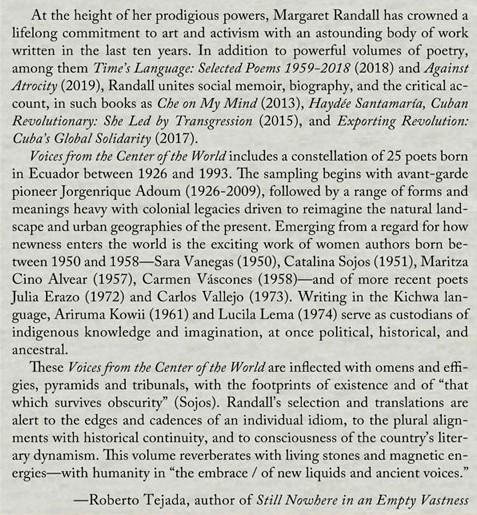
[Todas las fotografías han sido tomadas de la red mundial sin ánimo de infringir en cualquier derecho legal. Por favor contactarnos para incluir créditos o remover imagen.]
[Página preparada por Ana C Blum y corregida por Lizette Espinosa.]
